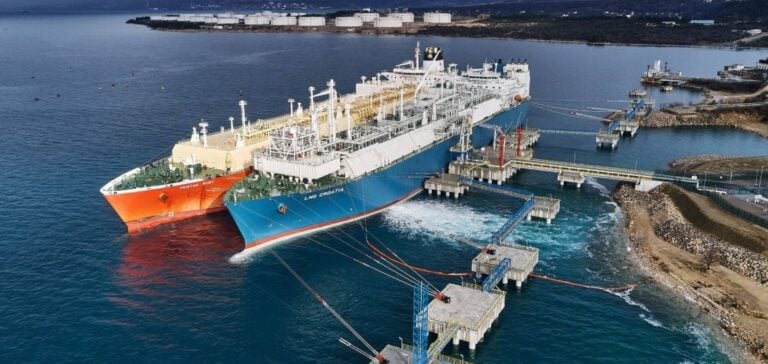The marked increase in regasification capacity throughout Europe was initiated in a context of supply reorientation. Several states acquired Floating Storage and Regasification Units (FSRUs) to increase their import flexibility. However, the significant drop in LNG imports observed this year suggests that these facilities are not operating at full capacity. According to cross-referenced information, Europe has imported less LNG than in some previous years, indicating a limited use of newly commissioned installations.
Slowdown in facility construction
Sector data indicate more modest growth in regasification infrastructure for 2024, with about an additional 1 million tons of monthly capacity added, compared to 3 million the previous year. This trend is partly explained by the variable competitiveness of LNG versus pipeline deliveries. Indeed, gas flows from Russia, Norway, or Algeria covered a significant portion of domestic demand, reducing the need for LNG imports on the spot market. The price gap between LNG cargoes and pipeline gas remains narrow, which does not encourage operators to maximize terminal utilization.
The slowdown is also observed in certain countries that already have surplus capacity. Facilities once intended to respond to a prolonged disruption in Russian transit are now operating at lower rates. This underutilization stems mainly from economic arbitrage: as soon as the price of LNG is not significantly more advantageous than pipeline gas, buyers choose the most profitable option.
Terminal utilization and pipeline flows
Observations show that certain terminals, such as Gate Terminal (Gate), Fos Tonkin (Fos Tonkin), or Adriatic LNG (Adriatic LNG), have recorded relatively high levels of activity. Specialists believe that modern terminals well integrated into the gas network can quickly respond to market fluctuations. However, continuous pipeline flows from Norway or Algeria have enabled various importers to limit their LNG purchases, particularly when domestic demand does not justify extra spot market purchases.
The possibility of a significant reduction in Russian gas volumes, in the event of transit agreements expiring, is drawing the attention of operators. Sources indicate that about 42 million cubic meters of gas per day could be affected, which, according to some calculations, corresponds to several LNG cargoes per month. Such a development would logically lead to greater use of existing terminals to offset lost volumes.
Evolution of the price differential
Europe’s Title Transfer Facility (TTF) gas market is often compared to the delivered LNG price on Northern European coasts. Recent data suggest that the price difference between delivered LNG and TTF gas is smaller than in other periods, limiting the opportunity to profit from cargoes. This situation encourages some players to postpone or redirect their LNG imports to more profitable regions. Meanwhile, gas storage in Europe remains robust, thanks to a combination of pipeline supply and occasional LNG deliveries when margins are favorable.
The pace of building new regasification facilities could resume if pipeline gas availability decreases or if LNG prices drop enough to become more competitive again. Some specialists view this duality between pipeline and LNG as a strategic advantage for the region. It indeed allows for rapid adaptation to global energy market changes, while ensuring a certain level of supply security.
Projections suggest that if a significant amount of Russian gas were permanently removed from the European market, dependence on LNG would rise substantially. With regasification capacity now available in several countries, the continent could absorb additional tanker flows if the economic conditions justify it. This flexibility positions Europe as an actor open to various forms of supply, maintaining a balance between pipelines and maritime shipments.






















